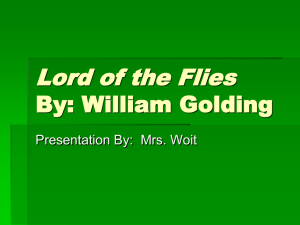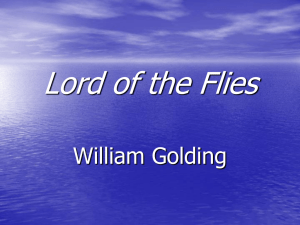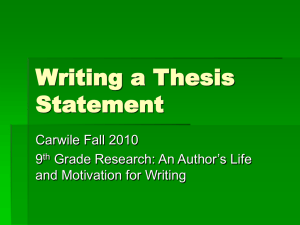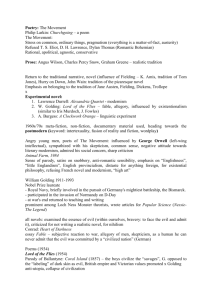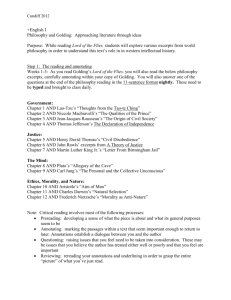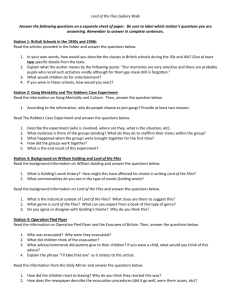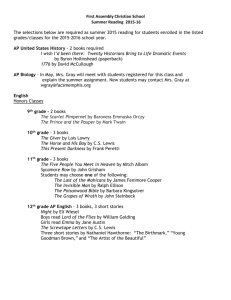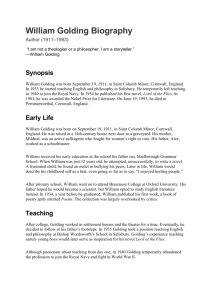Literary Criticism about William Golding`s Novels
advertisement
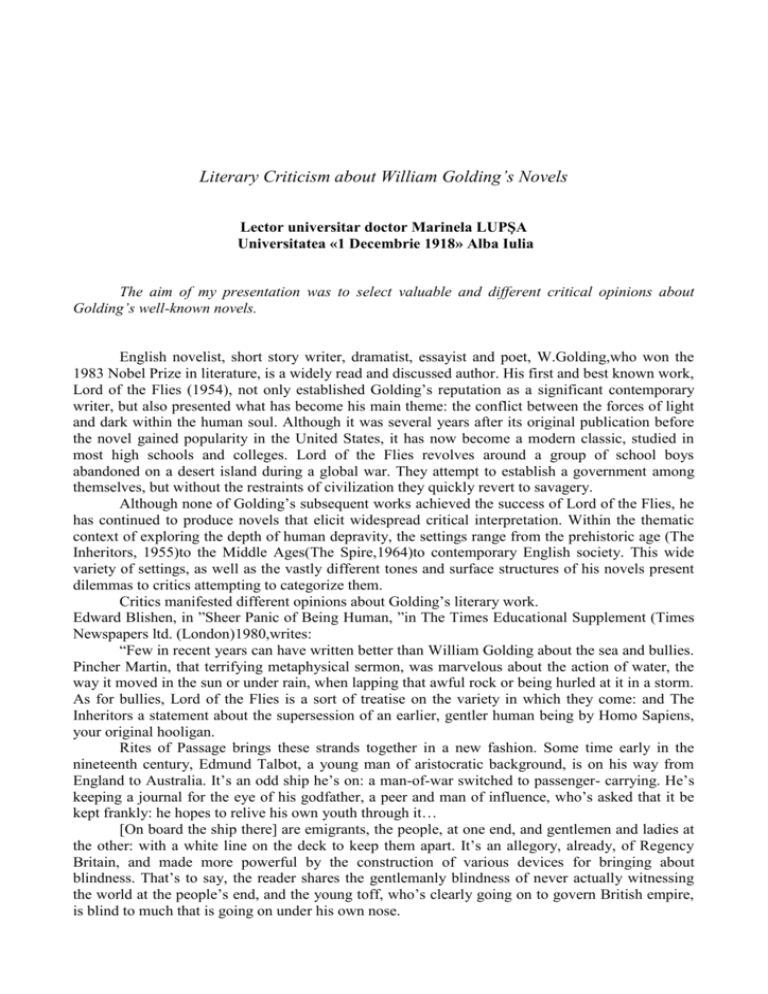
Literary Criticism about William Golding’s Novels Lector universitar doctor Marinela LUPŞA Universitatea «1 Decembrie 1918» Alba Iulia The aim of my presentation was to select valuable and different critical opinions about Golding’s well-known novels. English novelist, short story writer, dramatist, essayist and poet, W.Golding,who won the 1983 Nobel Prize in literature, is a widely read and discussed author. His first and best known work, Lord of the Flies (1954), not only established Golding’s reputation as a significant contemporary writer, but also presented what has become his main theme: the conflict between the forces of light and dark within the human soul. Although it was several years after its original publication before the novel gained popularity in the United States, it has now become a modern classic, studied in most high schools and colleges. Lord of the Flies revolves around a group of school boys abandoned on a desert island during a global war. They attempt to establish a government among themselves, but without the restraints of civilization they quickly revert to savagery. Although none of Golding’s subsequent works achieved the success of Lord of the Flies, he has continued to produce novels that elicit widespread critical interpretation. Within the thematic context of exploring the depth of human depravity, the settings range from the prehistoric age (The Inheritors, 1955)to the Middle Ages(The Spire,1964)to contemporary English society. This wide variety of settings, as well as the vastly different tones and surface structures of his novels present dilemmas to critics attempting to categorize them. Critics manifested different opinions about Golding’s literary work. Edward Blishen, in ”Sheer Panic of Being Human, ”in The Times Educational Supplement (Times Newspapers ltd. (London)1980,writes: “Few in recent years can have written better than William Golding about the sea and bullies. Pincher Martin, that terrifying metaphysical sermon, was marvelous about the action of water, the way it moved in the sun or under rain, when lapping that awful rock or being hurled at it in a storm. As for bullies, Lord of the Flies is a sort of treatise on the variety in which they come: and The Inheritors a statement about the supersession of an earlier, gentler human being by Homo Sapiens, your original hooligan. Rites of Passage brings these strands together in a new fashion. Some time early in the nineteenth century, Edmund Talbot, a young man of aristocratic background, is on his way from England to Australia. It’s an odd ship he’s on: a man-of-war switched to passenger- carrying. He’s keeping a journal for the eye of his godfather, a peer and man of influence, who’s asked that it be kept frankly: he hopes to relive his own youth through it… [On board the ship there] are emigrants, the people, at one end, and gentlemen and ladies at the other: with a white line on the deck to keep them apart. It’s an allegory, already, of Regency Britain, and made more powerful by the construction of various devices for bringing about blindness. That’s to say, the reader shares the gentlemanly blindness of never actually witnessing the world at the people’s end, and the young toff, who’s clearly going on to govern British empire, is blind to much that is going on under his own nose. “It’s beautifully done: because that side of Mr. Golding’s gift that has sometimes accorded ill with his somber moralities-the element of the eighteenth-century wit-is here given appropriate employment. It’s a novel that shows how the sheer panic of being human moves about, sometimes hideously, under the skin of that pretence of being at home in the world that we call civilization. Agree with Mr Golding’ s view of things or not, it’s marvelous to see how such a gift is now enjoying a harvest as fruitful as the one a quarter of a century ago. It may even be richer than the first. Here, in Colley, is Piggy of Lord of the Flies, dying again: and Pincher Martin’s unworldly friend. Here is the perception, deeply written into Mr Golding’s work, that ”Men can die of shame”. But here, too, is the quiet excellent Lieutenant Summers, who, is plainly unmonstruous and at the same time is not to be bullied. He is, I think, the author’s most convincing attempt to portray a good, strong human being. Robertson Davies expressed his own views about Golding’s novels in his study ”William Golding: Voyage to the Centre of the Self, ”in Book World-The Washington Post,1980, November 2,1980,p.5.The literary critic writes the following: “The deep satisfaction we feel in reading and reflecting on William Golding’s novels rises from his power to isolate, describe and make real to us moral problems that concern us all. The notable moralists of our day are novelists and poets. Philosophy is remote from the average intelligent person and the churches rarely command his allegiance, for all that he is eager to come to grips with serious problems of morality. Much popular fiction offers him nothing but a reflection of the easy, fashionable despair of those who paddle timidly in the shallows of experience, but William Golding tackles moral problems head on, and wrestles them to the floor. How does he do it? His mind possesses a coherent, compassionate but unsentimental attitude toward life and mankind, and his scale of values, though not inflexible, is firm. In the broad sense of the term it is a religious mind, because it is engaged with the great themes of our existence and will not be content with easy, pessimistic approaches to them. Too often pessimism is achieved by ignoring whatever cannot be made to fit its needs. His reflections present themselves to him in the form of fiction, and here again he is not satisfied with the bonelessness that contents those contemporary writers whose novels remind us of Edward Lear’s flopsican mopsican Bear. He brings a formidable professionalism to his writing, and his novels have the completeness that marks them as works of art… [In his latest book, Rites of Passage, Golding’s] splendid professionalism shows in the skill with which he takes the device of the personal journal and the letter, so familiar from the fiction of the period he has chosen for his story, and gives them convincing period quality, while at the same time insinuating into them a kind of insight which is post-Freudian. But these insinuations are never obvious; we never feel that the 20th century is nudging the 19th or that our age is pretending to some absolute superiority in judging human affairs. One of the marks of the novelist of the first rank is his capacity for what might be called impersonation, the ability to speak through a character in such a way that more is revealed than the character is directly aware of; young Mr. Talbot, who writes of himself as if he were a silly, snobbish young ass, comes off rather better than he could know. Colley, who writes as a man who has removed himself from all that is dark in man’s nature, provokes our pity. He is a man who has never seen his Shadow, and who is depending on his clerical rank and his feverish piety to overcome an inborn inferiority. He hopes to attain gentility through sanctity, an idea that could only occur to a fool. Here is where Golding will rub some of his readers raw, for it not a fashionable attitude to suppose that some people are naturally inferior, not in birth but in character. But this book anatomizes snobbery, that peculiarly English trait, in a manner that hints that snoberry may sometimes be a response to a genuine intuition, as is the case with Talbot. Although there is plenty of ambiguity in this novel, there are no loose ends; everything is present that enables the reader to draw extensive and possibly profound conclusions about what happened and why, and whether or not it was inevitable. The whole book is written with a fine economy. It seems to move easily and, when Talbot is writing, somewhat self-indulgently, but there is nothing unnecessary at any point; every joke, every scrap of flattery addressed by the godson to his noble patron, tells us something we need to know. The minor characters are drawn with a certainty of line and occasional enriching with color that reminds us of the pen and red chalk drawings of the period in which the story is set. This is very good Golding, and good Golding is among the best fictional currency we have. Its hallmark is a suggestion of hope, and that is a rarity in serious modern novels, so many of which are blighted by what old theologians called “wan-hope, ”by which they meant despair of salvation. B ut not William Golding: he is not Graham Green as all that”. Golding is a talented and original major British novelist, reflects Kenneth Rexroth, ”William Golding: Unoriginal Sin,” In the Atlantic Monthly (copyright 1965 by The Atlantic Monthly Company, Boston, Mass.; reprinted with permission), May, 1965, pp.96-8. “Golding’s novels are rigged. All thesis novels are rigged. In the great ones the drama escapes from the cage of the rigging or is acted out on it as on a skeleton stage set. Golding’ s thesis requires more rigging than most and it must by definition be escape-proof and collapsing… “Free Fall” should be the best of Golding’s novels. The people are more vividly drawn motives are more complex. There are dramatic rather than melodramatic tensions. The thesis again is Golding’s obsession, original sin, but in this case the story is of the struggle to transcend it. Furthermore, since the characters seem at first not presented purely as vehicles of the thesis, it is possible to judge them as people. So judging, it is apparent that there’s something nasty about all of Golding’s people; not evil, just nasty. They are uncleanly seen. If you are going to undertake this journey, you should never forget that the clarity of Dante’s vision is never impeached by the confusions of either the damned or the undamned… “The Spire” is the most exasperating of all these books. This is not the Middle Ages, and it is certainly not Salisbury Cathedral. It is certainly William Golding. The Bad Rover Boys on a Desert Island, The Bad Rover Boys at the End of the Ice Age acquire a sequel-The Bad Rover Boys in the Age of Faith Build a Cathedral. Again, Mr.Golding judges human beings, past or present, far or near, the way a British school master who doesn’t like teaching in a provincial town regards his charges. This is a symbolic tale of the upwardly mobile with a vengeance. The thesis is they are snotty-nosed little boys. May be they are; they seem to enjoy being told they are. What depressed me most, writes the critic, was that Mr.Golding doesn’t even like that pretty church, perhaps because it is so perfect an expression of style. He shouldn’t only get another job; he should move. May be he has. He’s sold enough books to live on the Riviera where it is stylish”. In “Innovation and Rediscovery in Golding’s “The Pyramid”, in Critique: Studies in Modern Fiction,vol. XIV, No.2, 1972,pp.97-112., Arnold Johnston expressed his opinions about the “Pyramid” and not only. His critical opinions are sustained and argumented. “The Pyramid” is informed throughout by the prevailing note of irony apparent in all of Golding’s work, but the narrative tone, perhaps best described as tragicomic, is new-at least in the degree to which it is employed here. Golding once characterized ”Pincher Martin”(1956) as ”a blow on behalf of the ordinary universe, ”and perhaps his subsequent novels may also be identified as such. However, as one may conclude from the direction of his development through ”Free Fall”(1959) and “The Spire”, Golding has come to believe that such blows may best be struck by attempting to recreate that universe in terms more comprehensive, less symbolically intense. In a review of “The Pyramid ”Denis Donoghue goes even farther, proposing that Golding would perhaps ”like nothing better than to write a loose baggy monster of a novel, possessed of life to the degree of irrelevance”. Donoghue judges “The Pyramid” as an attempt on a modest scale to write such a novel,as ”an embarrassment, a disaster”, because Golding’s imagination is ”alien to memory”. “In dealing with a writer of Golding’ a stature, one feels compelled to reexamine his apparent failures-like ”Free Fall”-to avoid judgements based on misunderstanding of their purposes, and to measure their possible contributions to the further development of his art.”The Pyramid”seems to represent an effort by Golding to explore the life of social man through fuller commitment to the mode of fiction, or as do Donoghue would have it, memory, indeed an appropriate term in relation to “The Pyramid”. The novel is full of correspondences to Golding’s life and earlier works. In ”The Pyramid”, as in his previous novels, Golding reexamines the sources of the insight that motivates the work at hand, this time traceable in large part to his own past. Knowing Golding’s methods, one may not be surprised that his first real ”autobiographical ”novel was written only after it could be sufficiently justified by thematic and technical necessity… The structure of “The Pyramid” invites comparison with Pincher Martin and Free Fall, since all these novels incorporate discontinuous time schemes and flashbacks. Golding’s purposes differ from one novel to the other: the flashbacks in Pincher Martin hardly produce a coherent, substantial study of Martin’s life and times; and Free Fall, too, is ultimately more concerned with Sammy than his surroundings; but both novels were assailed for their failure to create a sufficiently convincing sense of social reality, a sense that is definitely present in The Pyramid. The time scheme of The Pyramid is much less puzzling, less liable to misunderstanding than those of the earlier books; unburdened like Chris by the fear of reality, or like Sammy by the desire for significance, Oliver narrates clearly; and the self-completeness of each episode leaves the reader free to draw parallels and infer thematic relationships as he will, without obvious authorial manipulations. Indeed, The Pyramid seems much like a second version of Free Fall, with more substantially realized-because more autobiographical-plot and characters, and less overt concern with the problems of significance and communication that were apparently resolved in The Spire… “The Pyramid” is much more complex than most of its clearly reviewers and critics have found it to be; the book is as symbolically dense as any of Golding’s previous novels while at the same time dealing more extensively with the contemporary world and exploring new dimensions of characterization and human interrelationship. Much of the added social breadth and detail of the novel [stem] from its autobiographical aspects; much remains in Oliver’s story, however, that cannot be easily traced to autobiographical sources or to the working out of its intricate symbolic pattern. A close reexamination of the book reveals that here, as in Free Fall, Golding’s imagination apparently challenges the vision of a towering literary figure: ”The Pyramid”, Golding’s first real attempt at a social novel, seems to parallel ironically the finest social novelist, Charles Dickens. Oliver’s story corresponds, in a number of important respects, to that op Pip, the protagonist of “Great Expectations”. The parallel is suggested even by general likeness: both novels deal with the central theme of spiritual blindness, as caused both by the pressures of society and individual obsession; both emphasize in similar ways the power of selfless love and count the cost in guilt and wasted lives of blindness to its necessity; both are first-person narratives of a young man’s journey in such darkness to a somber self-awareness of his guilt in middle-age; both possess an anecdotal flavor and a tendency to derive both humor and insight from human eccentricity and the ironic possibilities of an immature narrator… The intent of such a parallel would seem twofold: to render Golding’s criticism of the modern world more trenchant; and more important, to ”correct” Dickens’ novel, both thematically and technically. On the one hand, Golding underscores, by comparison with Dickens’ fictional world, the banality and meanness of his own; in almost every instance…the modern characters are distinctly diminished in moral or dramatic stature in comparison with their nineteenth-century counterparts, and their world, consequently, is a duller, less hopeful place. This is precisely Golding’s point: the world of ”The Pyramid”, unlike that of “Great Expectations”, is carefully pruned of any sentimentality that might soften its somber theme. The issue of guilt is deliberately clouded in ”The Pyramid” ,to emphasize the complexities that plague modern man’s attempts either to affix or accept moral responsibility… Without clearcut villains, ”The Pyramid” has no Dickensian melodrama and coincidence, digression and repetition…Although ”The Pyramid” succeeds in presenting a more ”realistic” and concentrated embodiment of its themes than does ”Great Expectations”, it does so at considerable cost in other important fictional elements. Golding’s apparent reduction of Dickens’ world to a size that corresponds to the world of his own vision demonstrates not only the persistent singlemindedness of that vision and his confidence in his own powers, but also his present limitations as a writer. If ”The Pyramid” creates a world more typical than that of “Great Expectations ”and presents an accurate picture of modern man’s isolation from his fellows, it also sacrifices Dickens’ wider sense of humanity, his delight in weaving a complex and fascinating web, not primarily of symbols, but of human action. Perhaps more important, ”The Pyramid” sacrifices the high dramatic tension, not only of Dickens’ novel, but of Golding’ s own earlier works. “The Pyramid” shows Golding once more in a state of artistic flux, expanding his own vision beyond its former limitations, but at the same time unwilling to abandon himself completely to chaos. Unlike Dickens, he is not yet, and perhaps will never be, a writer who ”revels in the vitality of the ordinary universe.”… Perhaps, the major difficulties that Golding faces in a future working out of his expanding vision may be seen by focusing on two related features of his first six novels. The first of these is the tendency, as in ”The Pyramid”, to use works by other writers as ironic foils of his own, his tendency to say, like Sammy Mountjoy [in ”Free Fall”],”Not that-but this!” The second feature of Golding’s works that must be resolved, if his new approach to fiction is to succeed,is his apparent inability to find in the contemporary social world more than the vitiated drama and tragedy of such characters as Oliver and Sammy Mountjoy. Only in ”The Spire”, which is far from contemporary, does Golding creates a fully integrated blend of the historical and the tragic. Perhaps the answer lies…in his choice of protagonists. Golding’ s art, reactive as it is, seems to require as a protagonist a foil of sufficient stature to allow his vision the detachment it needs to realize its full dramatic power. In his last three novels only one protagonist, Jocelin, of ”The Spire”, has been a successful foil; Sammy and Oliver-perhaps because of their autobiographical aspectsseem too close to Golding’s most striking limitation and a major source of his unique power.” Samuel Hynes, in his work” Grief, Sheer Grief, Grief, Grief,” appeared in The New Republic (reprinted by permission of The New Republic; 1982, Inc., vol. 187, no.11, September 13,1982,pp.36-7, concludes that: “…I think William Golding is the most interesting English novelist now writing…I’d be surprised if[that proposition] were widely accepted; Golding’ s interest has always been in finding possible forms for his moral vision, and not in the forms themselves. The forms have changed from novel to novel because the vision demanded new paradigms, but the vision has remained constant: man is fallen, evil is actual, suffering is certain, redemption is necessary but unlikely. It is a bleak reality that Golding goes on reimagining, but not an empty one; and better a bleak world containing good and evil than a cheerful one containing neither.” “Golding defines the theme of “Lord of the Flies ”as” grief, sheer grief, grief, grief,” and the other novels share that theme. But, as a character in one of Faulkner’s novels says, ”Between grief and nothing, I will take grief.” And so will Golding. “For a man like William Golding, without any particular philosophic or speculative gifts, without even much evident knowledge of the systems that he is rejecting, to set himself imaginatively against the current of his century is an extraordinary gesture: an act of courage. And an act that was necessary to create the conditions of his art”. BIBLIOGRAPHY Blishen, Edward, Sheer Panic of Being Human, in The Times Educational Supplement (Times Newspapers Ltd.(London) 1980;reproduced from The Times Educational Supplement by permission),no.3357,October 24,1980,pp.18. Davies, Robertson ”William Golding: Voyage to the Center of the Self”, in Book World-The Washington Post 1980,November 2,1980,p.5. Donoghue, Denis, ”The Ordinary Universe, ”in The New York Review of Books (reprinted with permission from The New York Review of Books, December 7,1967,pp.21-4. Hynes, Samuel, ”Grief, Sheer Grief, Grief, Grief, ”in The New Republic (reprinted by permission of The New Republic, vol. 187, no.11, September 13,1982,pp.36-7. Johnston, Arnold, ”Innovation and Rediscovery in Golding’ s The Pyramid, ”in Critique: Studies in Modern Fiction, vol. XIV, no.2, 1972, pp.97-112. Rexroth, Kenneth, ”Willliam Golding: Unoriginal Sin, ”in The Atlantic Monthly (copyright 1965 by The Atlantic Monthly Company, Boston, Mass.; reprinted with permission), May, 1965, pp.96-8.
